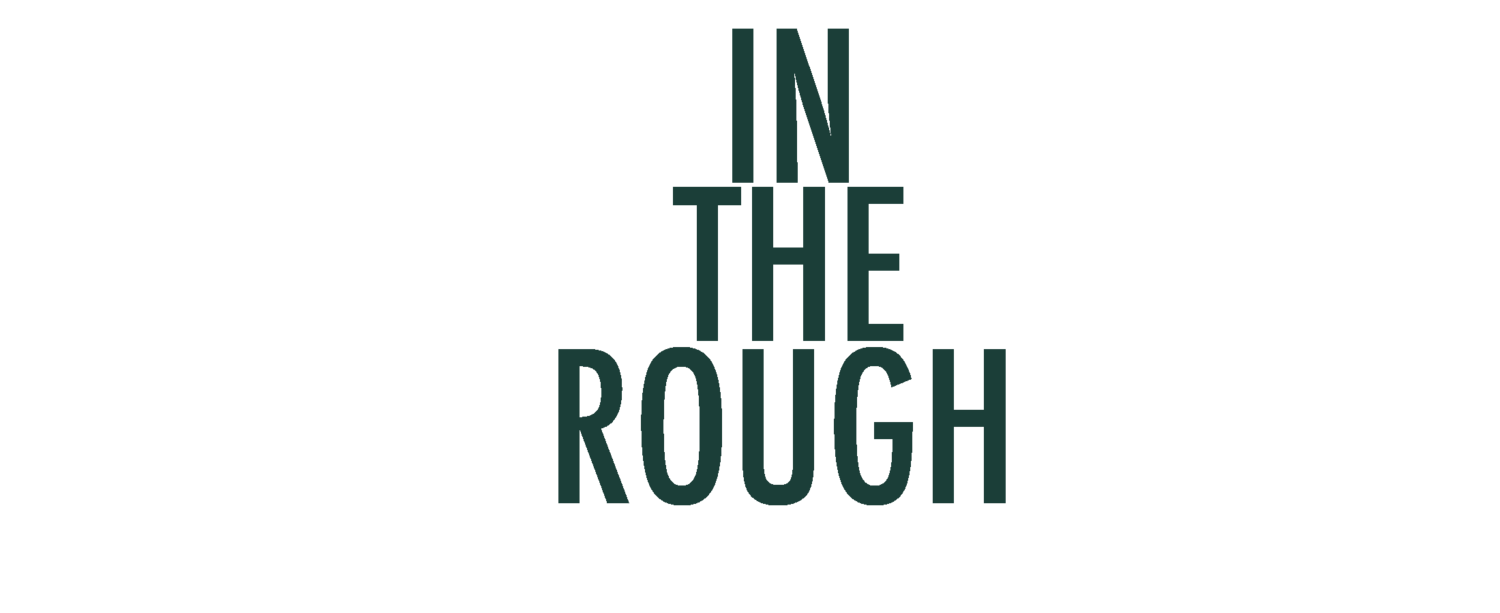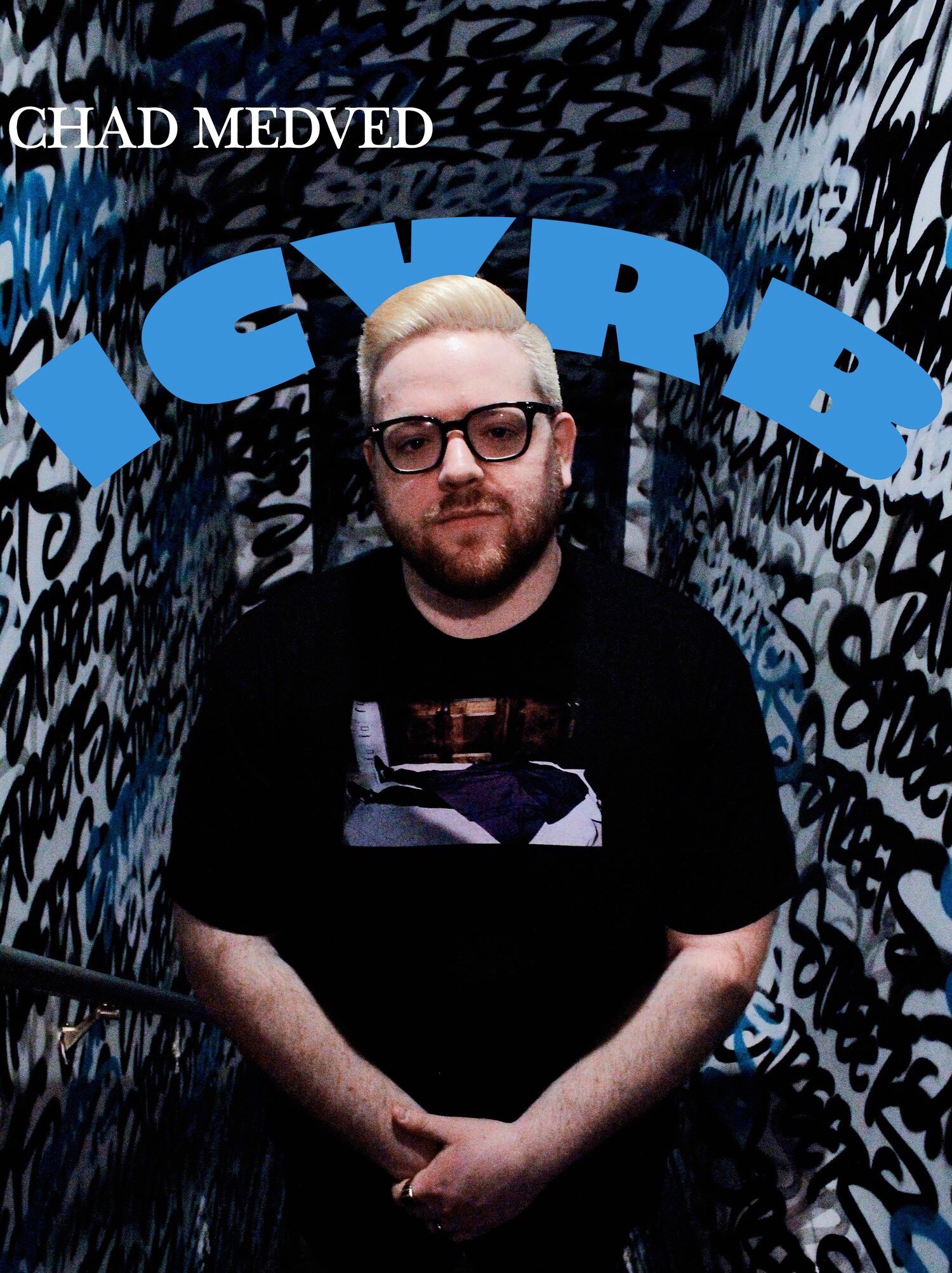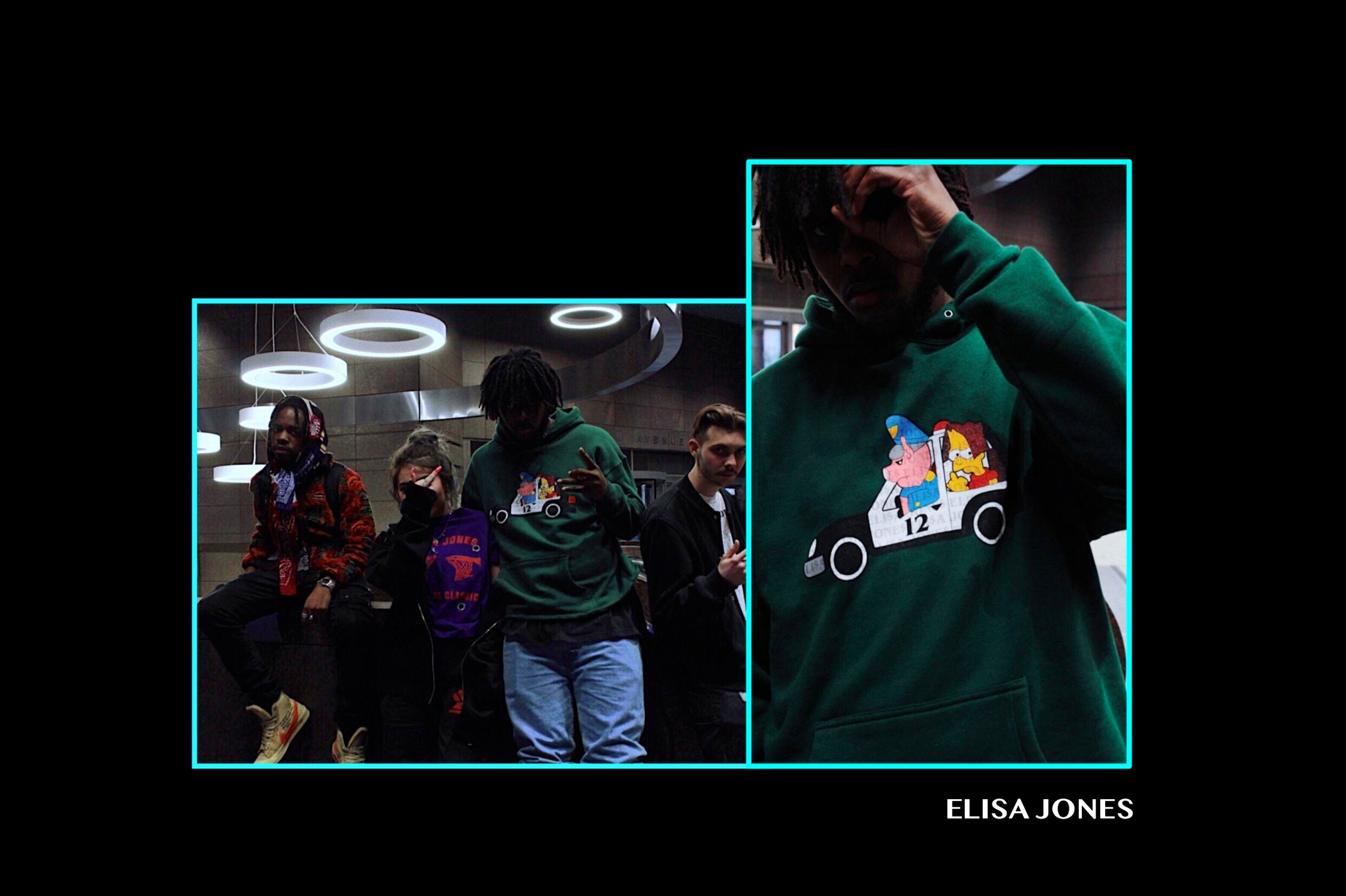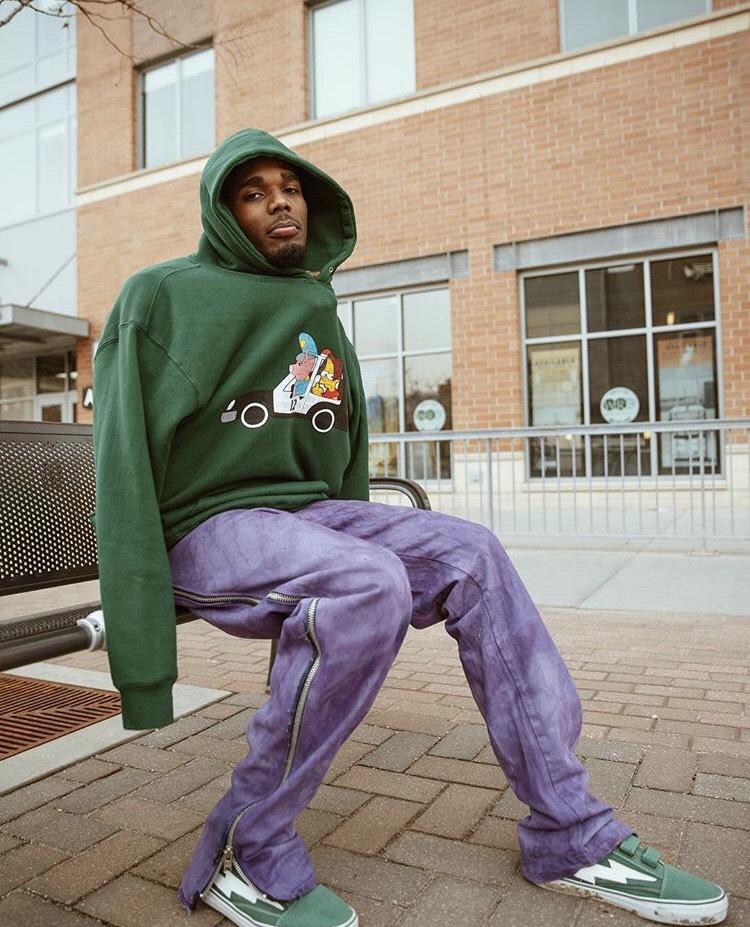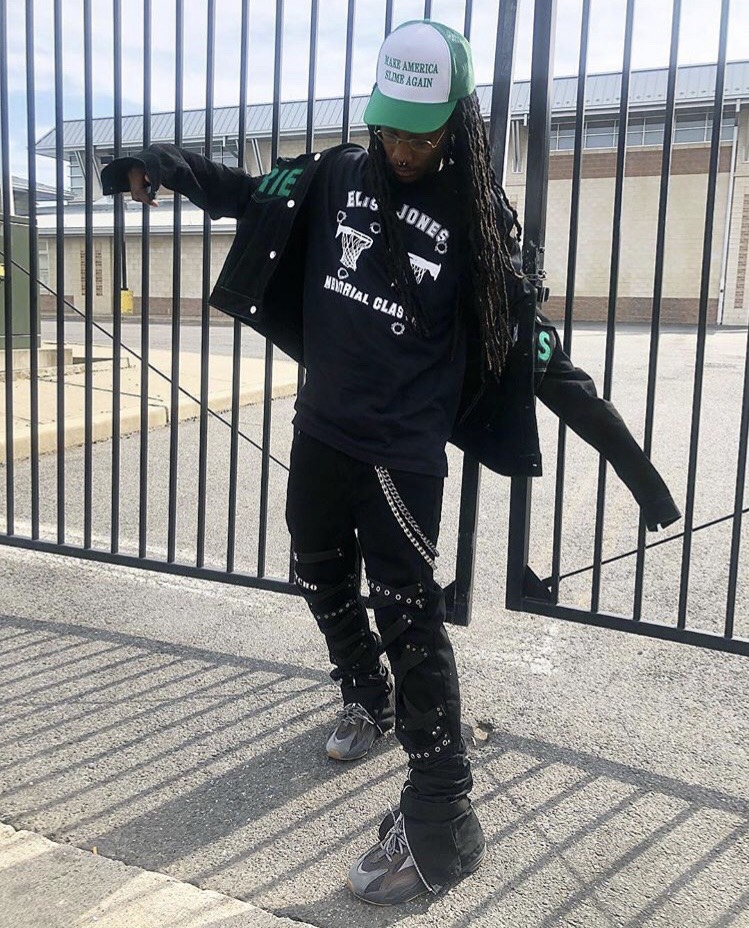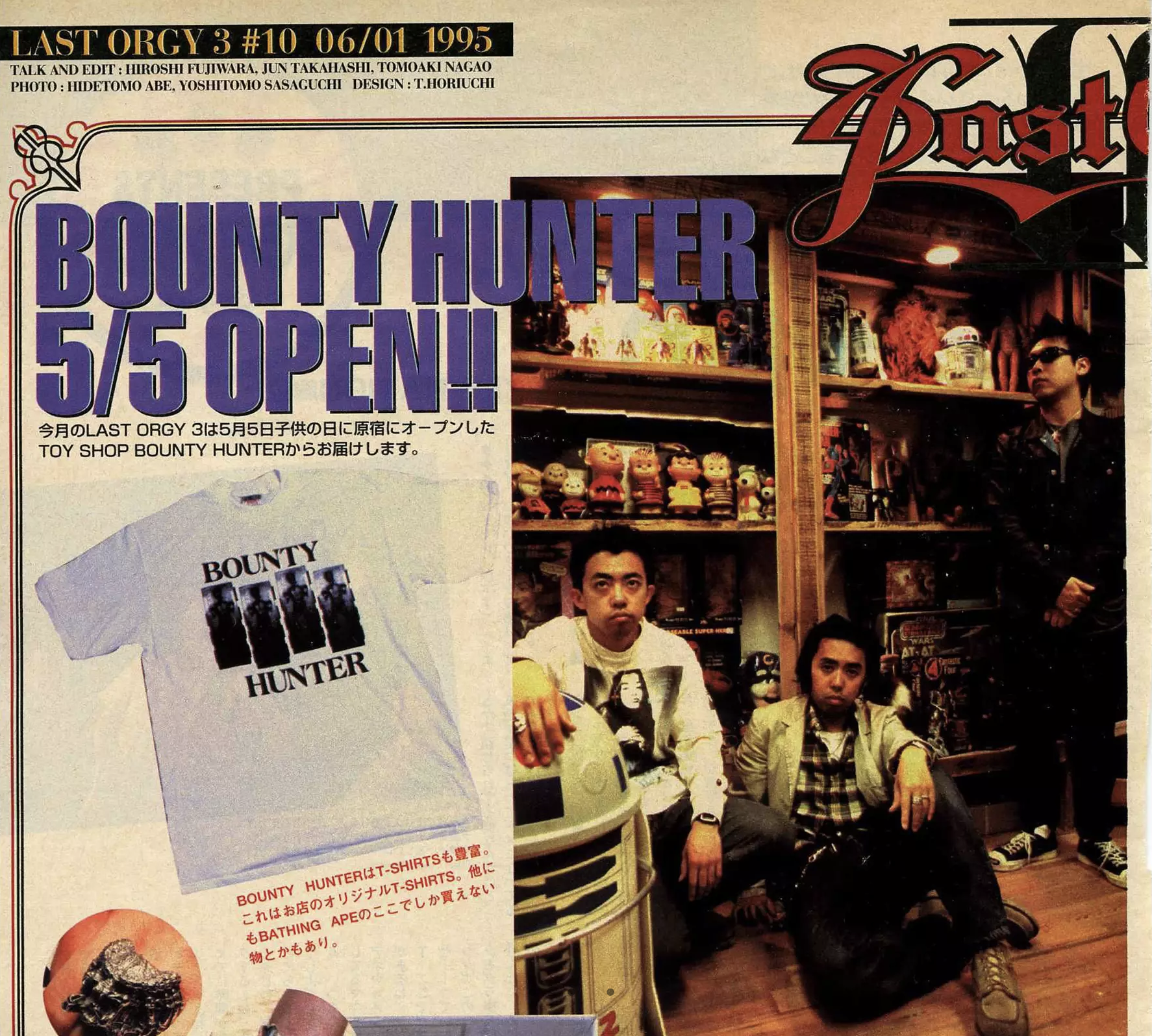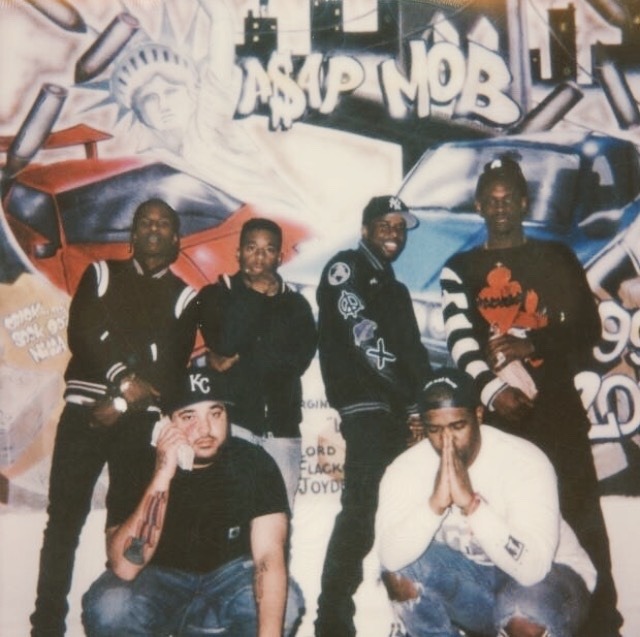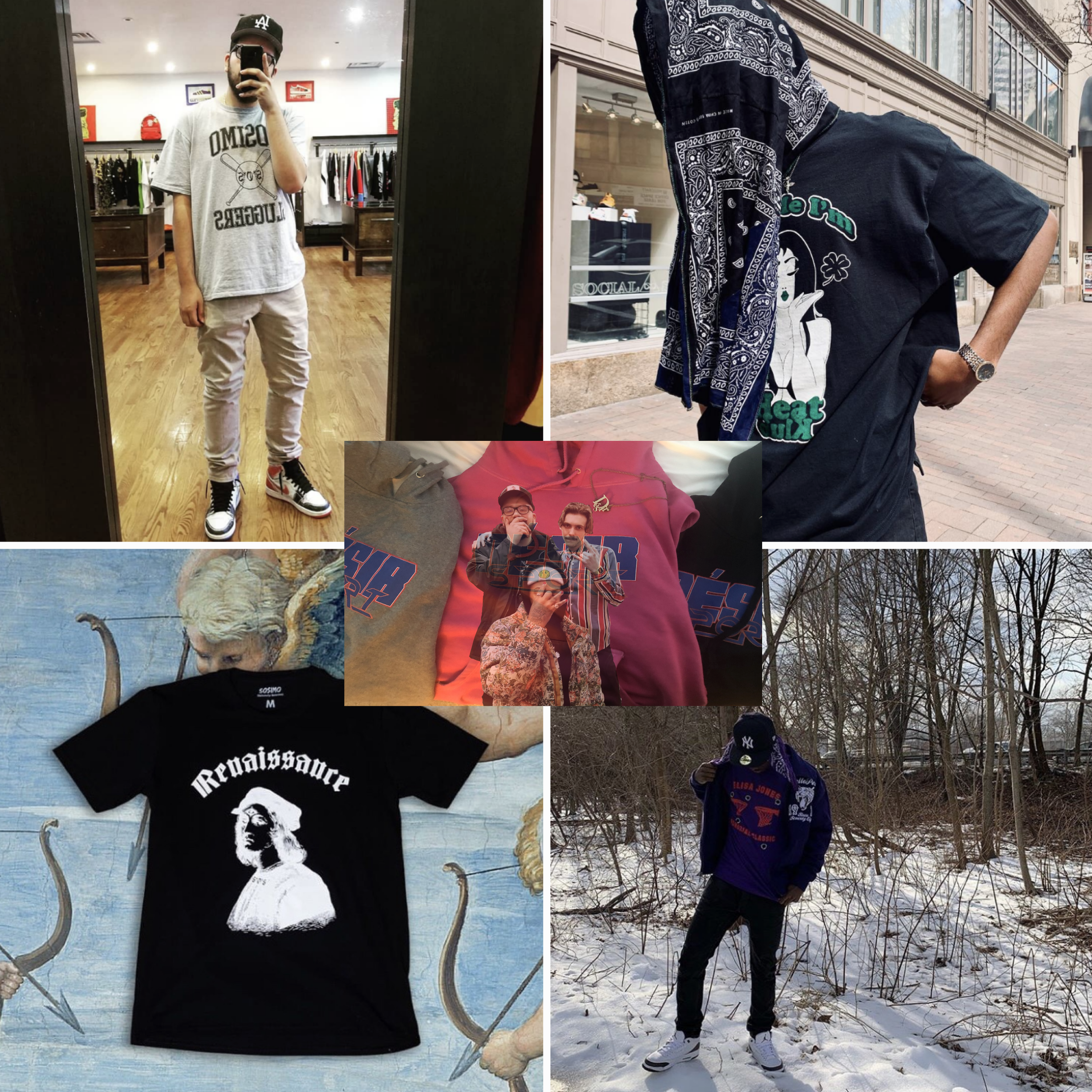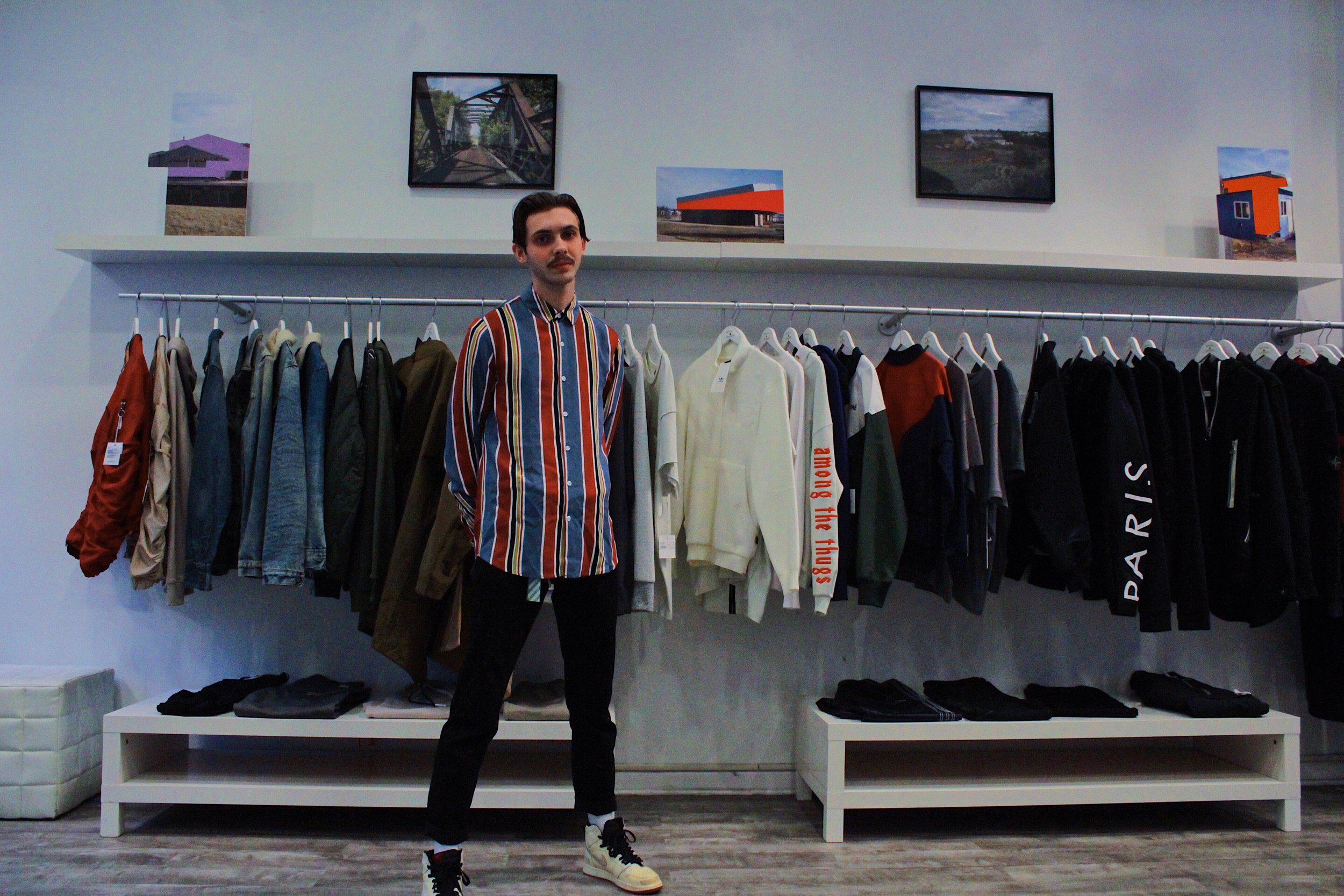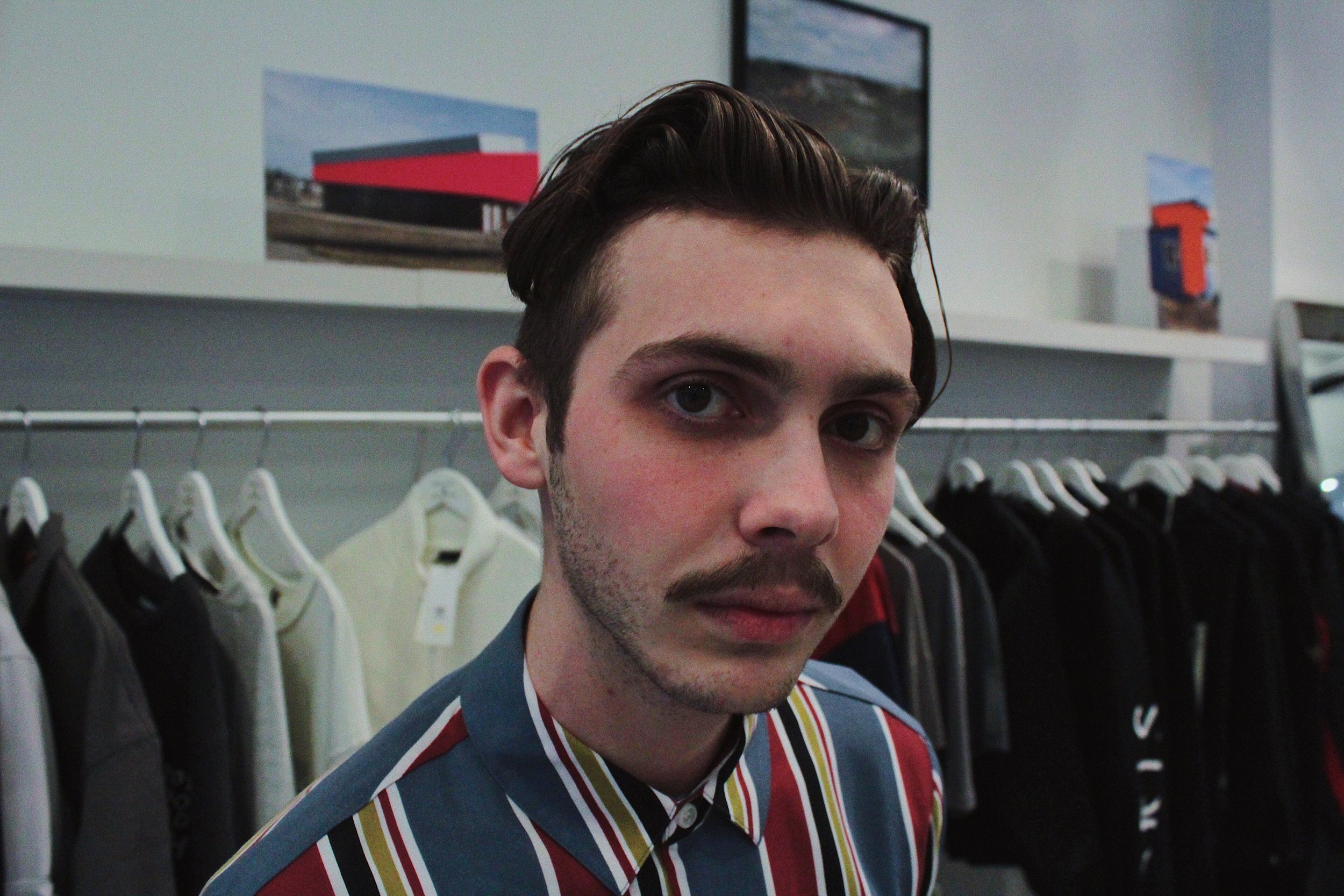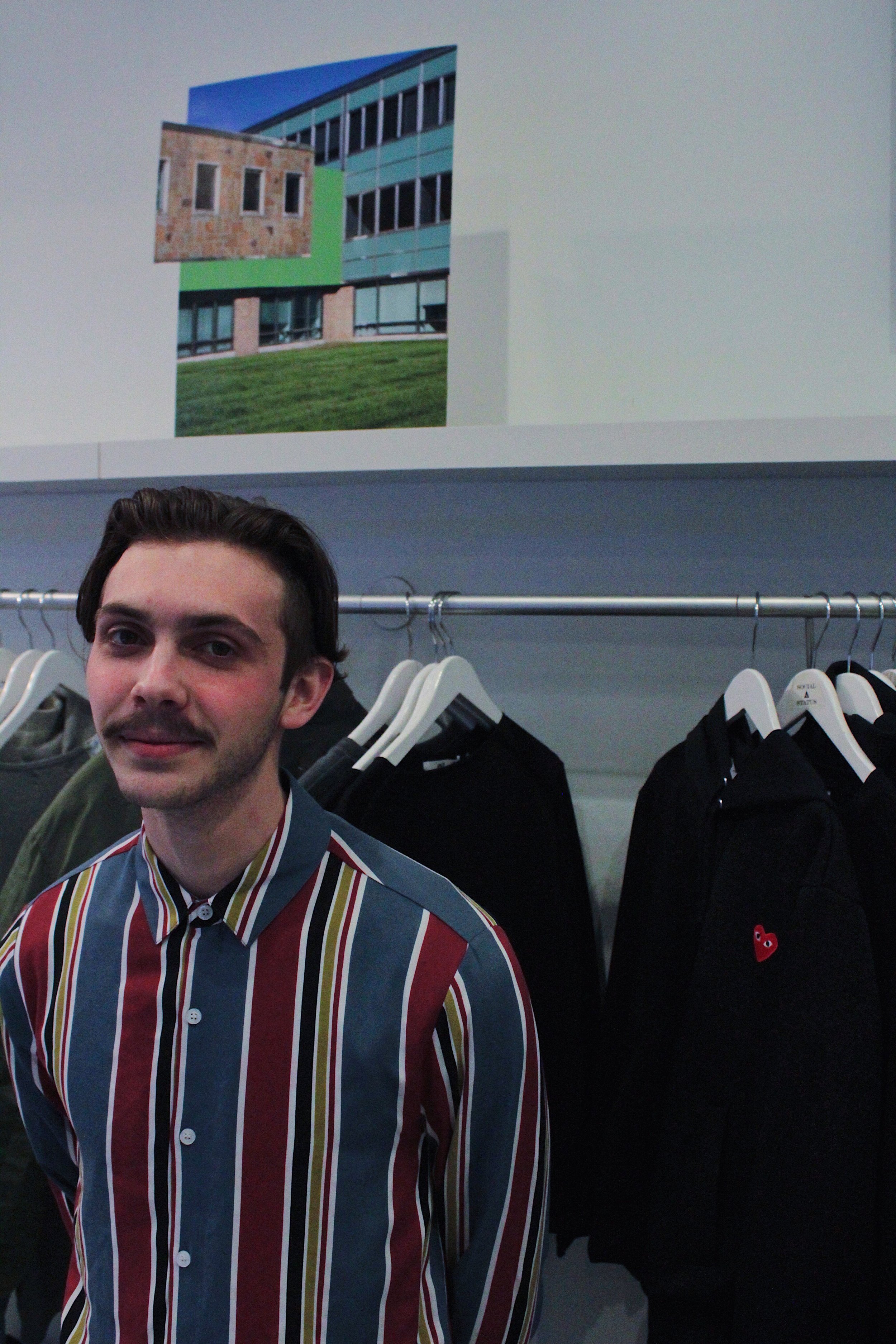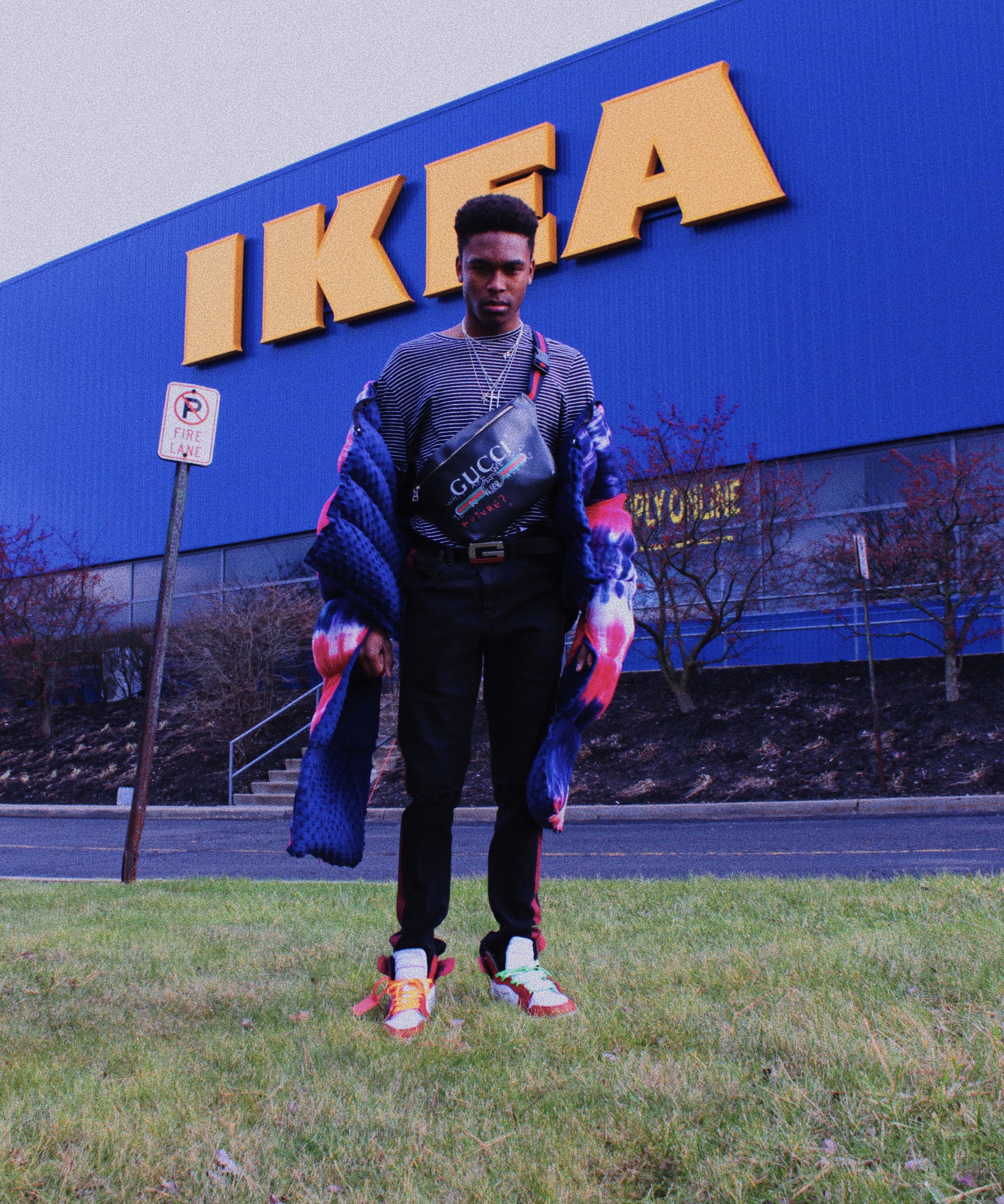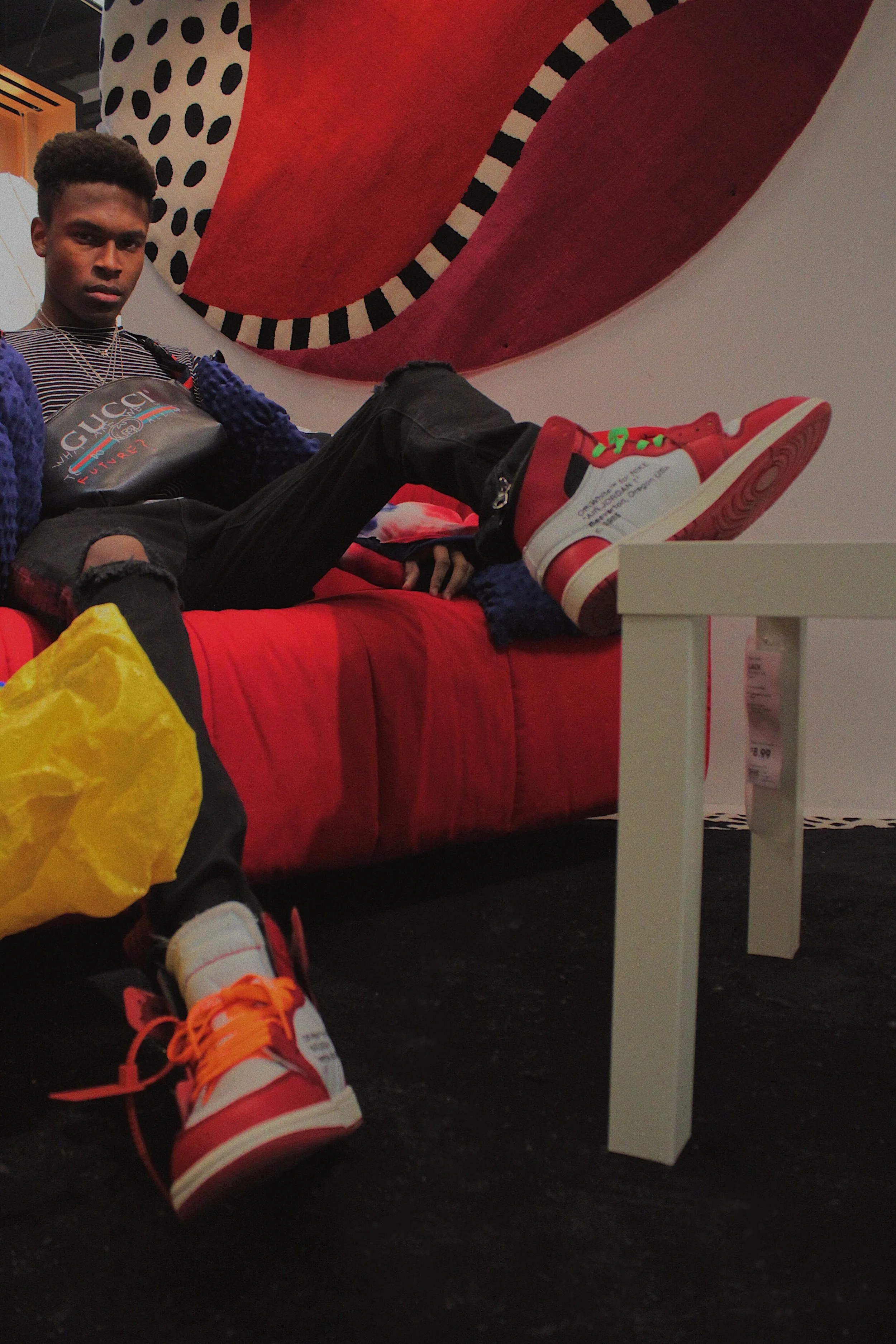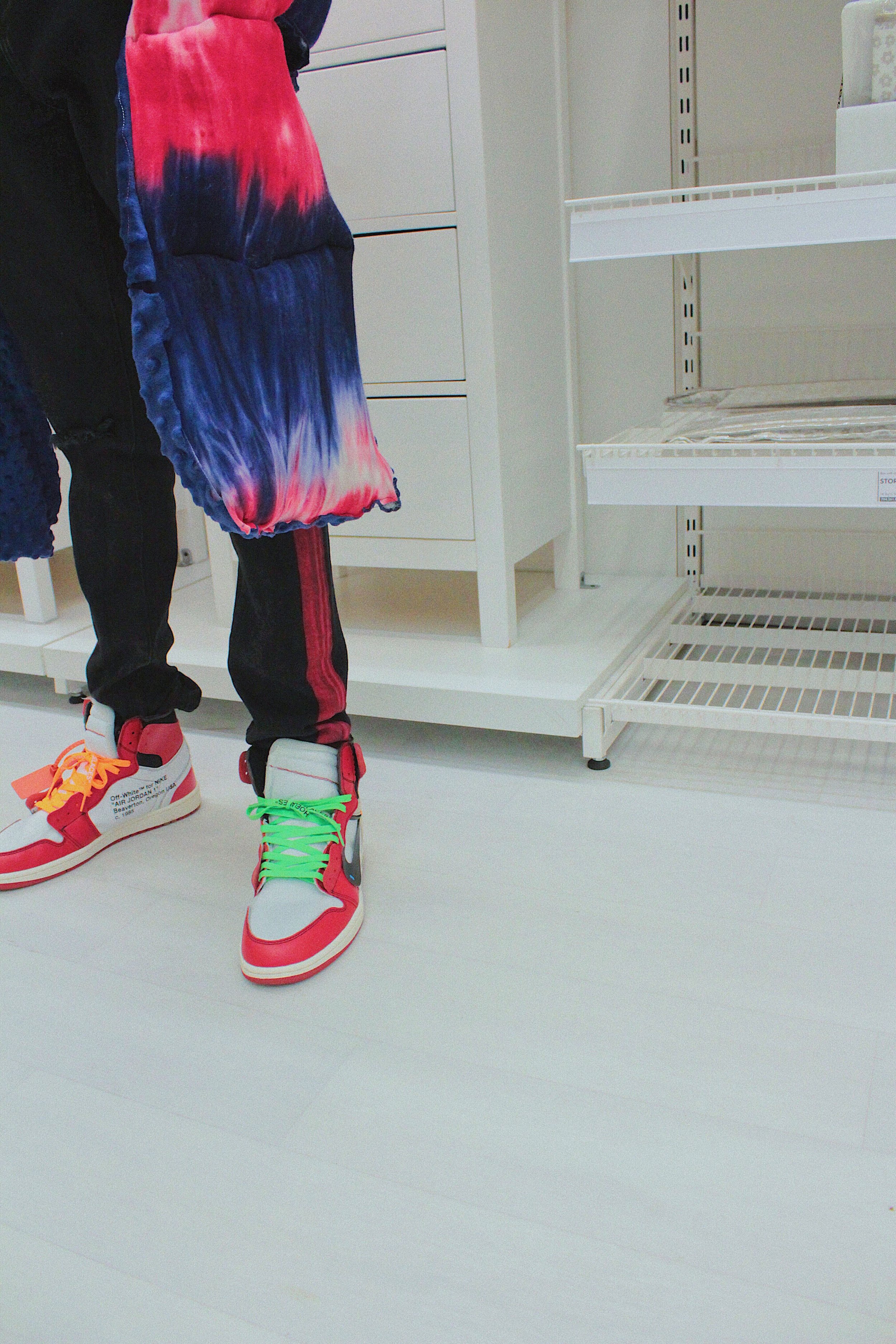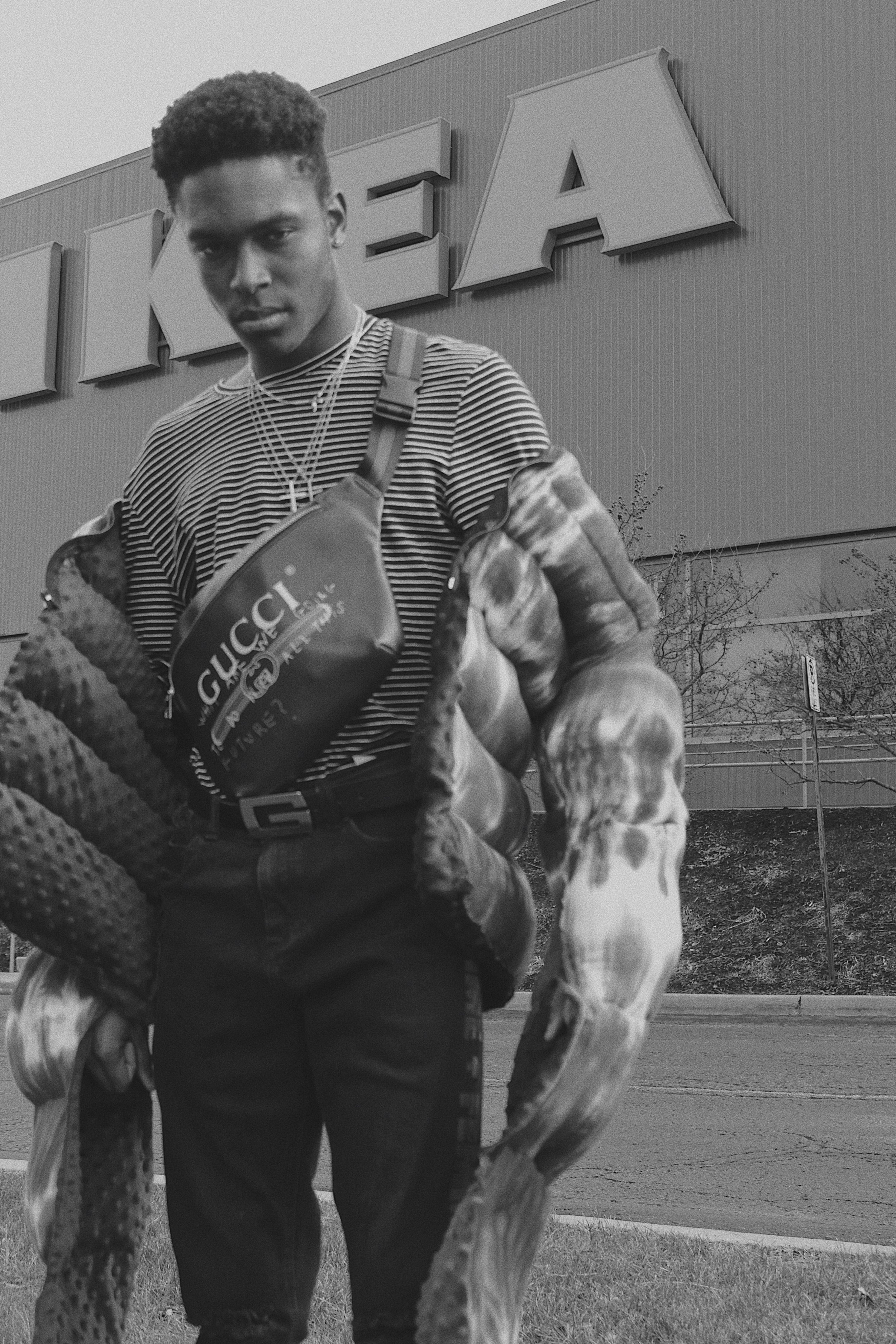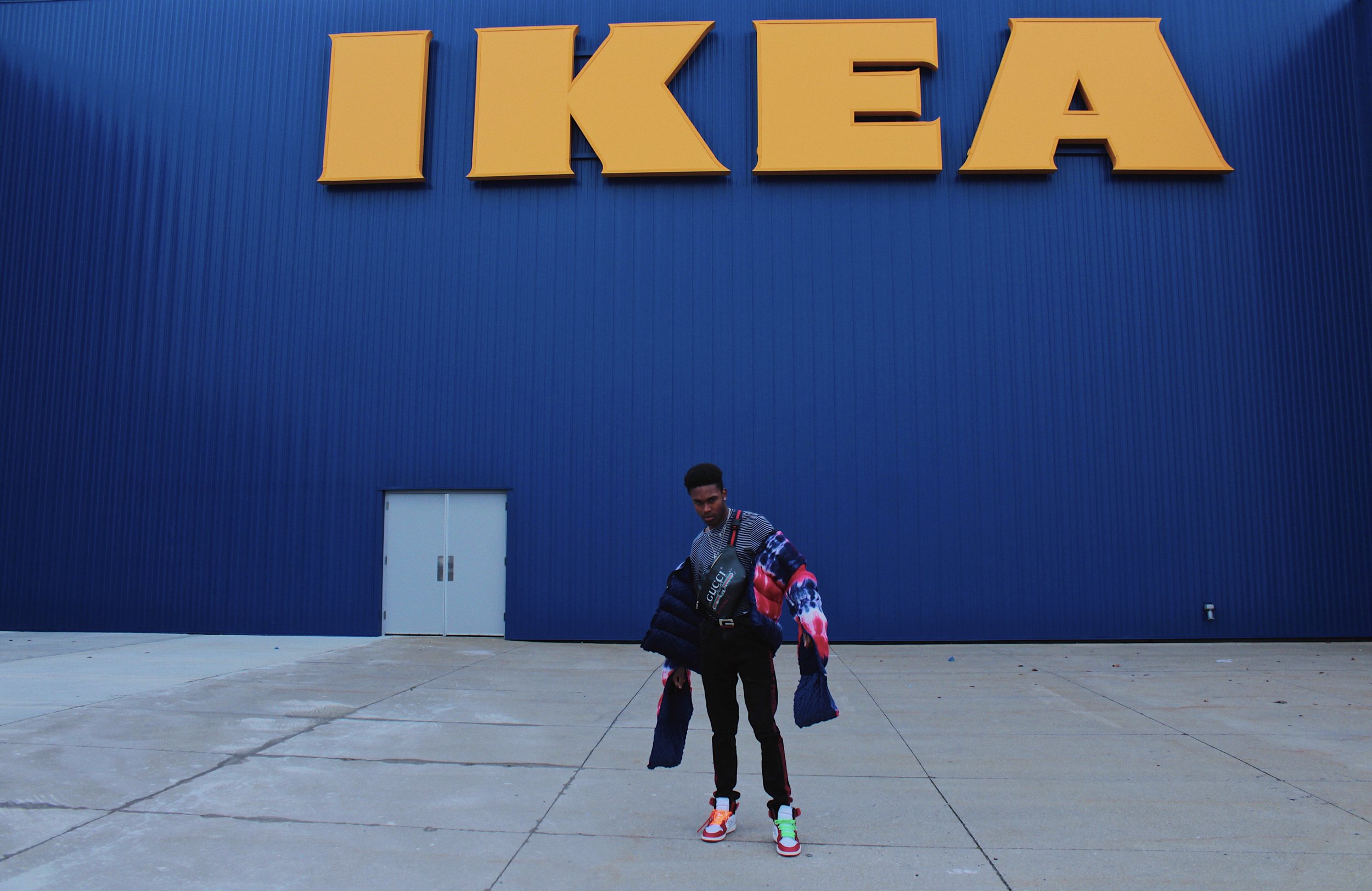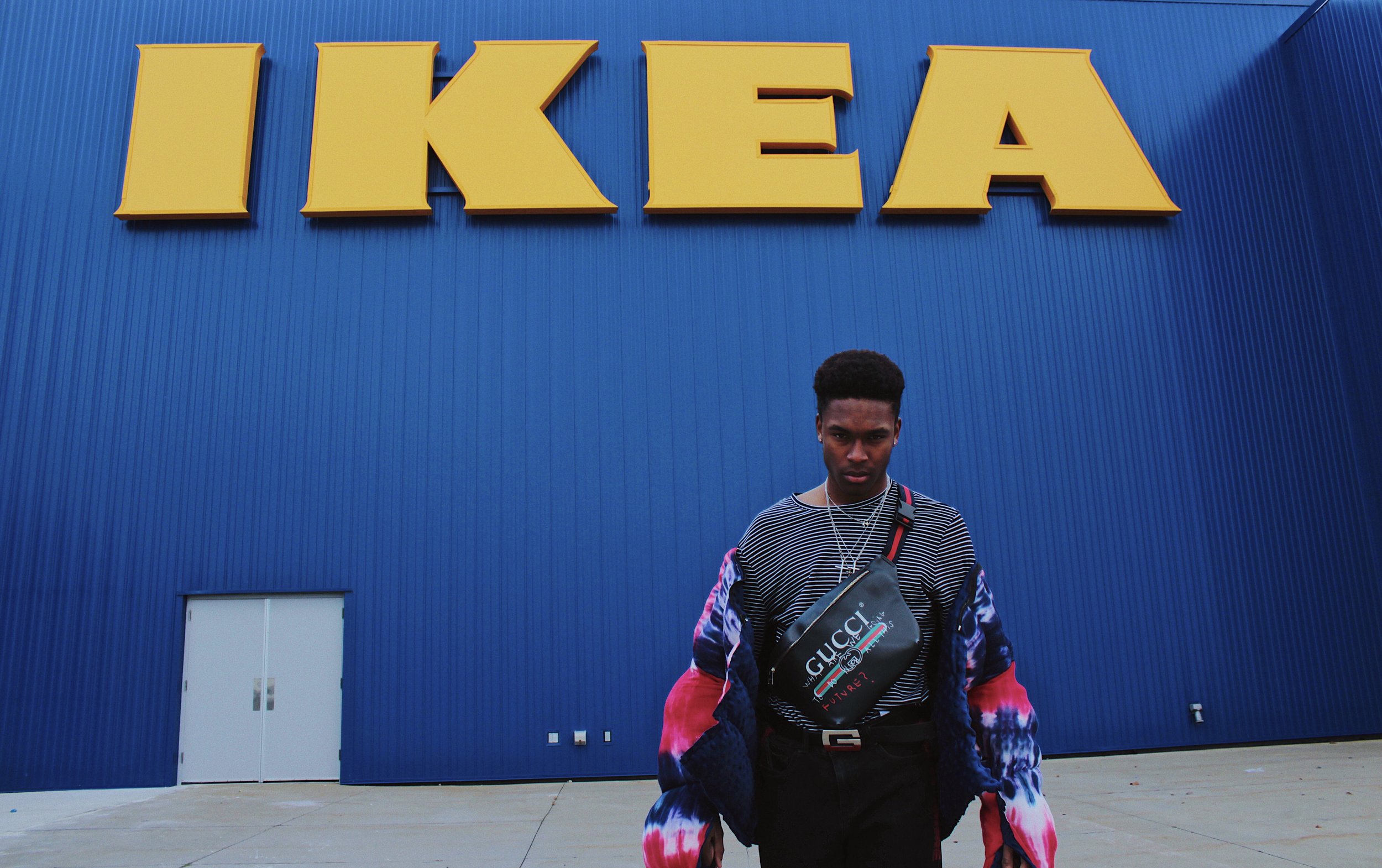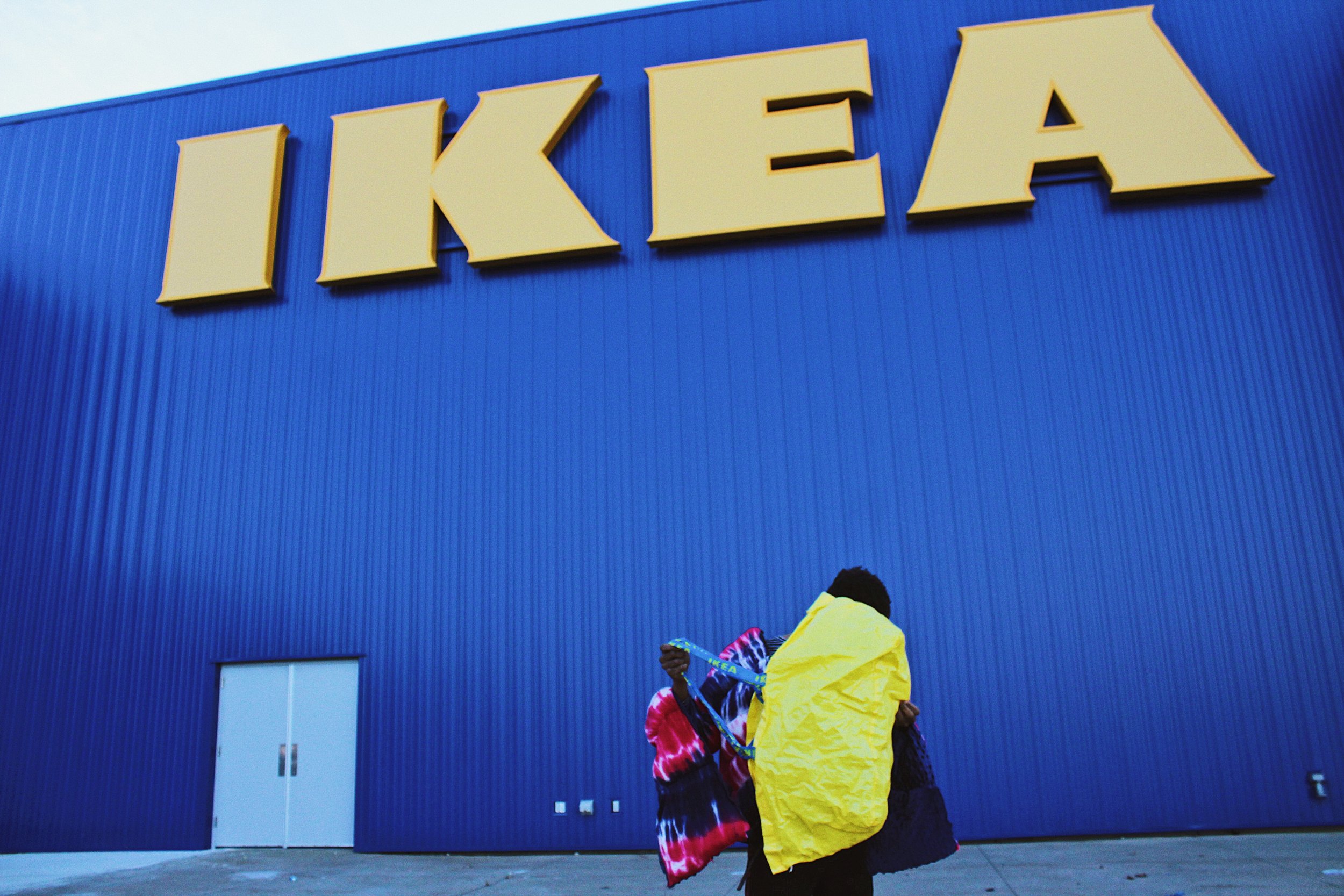The Host of I’ll Call You Right Back Podcast Talks About His Interests
Photo by Alex Young
Chad Medved, a 28-year-old originally from McKeesport, Pa., sits at Streets on Carson, a fun restaurant with traffic lights hanging as chandeliers at the booths, decor by graffiti writer Narf, and a scaling mural with a pig and chef’s knife on it. The eatery delivers global street food to East Carson Street on Pittsburgh’s South Side. “My go-to is the 24 Carat Wings and their Philly Cheese Steak. I’ve never had anything bad here. I swear to God,” he explains.
Basically, Medved aims to expose the people he thinks are doing cool things to any mass of people who will listen to him. I was his audience as he introduces me to Streets on Carson. Typically though Medved’s audience is put on to interesting characters through his podcast called I’ll Call You Right Back.
He likes certain cultural oddities such as the ‘drinking the Kool-Aid’ part of the Jonestown massacre. “Take a sip… You’ll love it,” a T-shirt reads advertising Medved’s podcast. While interviewing with InTheRough, he wears a T-shirt depicting a Heaven’s Gate victim covered by the purple blanket donning Nike Decades on their feet. This shirt is only available to people who actually feature on an I’ll Call You Right Back episode. “I just like what I like,” Medved says describing the cults as a marketing tactic.
Episode number 25 with funeral director Sarah McAlee is his favorite to date. “I feel the people I find are unique in the way they explain what they do,” he says. Medved’s curiosity comes from wanting to learn about different lanes people occupy. Episode 64 features Alyssa Fine who is a beekeeper. “I curate things differently… You gotta make it a variety.”
Reaching over 15,000 podcast downloads and 66 episodes since his first on January 11, 2018, Medved has made I’ll Call You Right Back a success with eclectic guests who appeal to everyone. While some episodes feature unfamiliar people and topics, others key in on Pittsburgh’s community of creative people shaping the city’s culture. He speaks with major players who keep a low profile like the music producer who has worked with the likes of Mac Miller and Wiz Khalifa, Big Jerm. His latest episode is with the Sean Wotherspoon of The ‘Burgh, Zed of vintage streetwear boutique Shop Zeds. Guests feel comfortable on I’ll Call You Right Back usually sitting on Medved’s cozy couch in his living room for the show. They open up their personalities during the interview and “that’s where you learn who people are,” Medved says.
“Experience is the main thing you need to have in life. You need to have experience because people could talk all this shit, but if they never experience, they don’t know.”
Ultimately, Medved puts human experience on tape so other people can learn from it. His goal is to get I’ll Call You Right Back on SiriusXM Satellite Radio. “I just want to be able to pay my bills by doing what I love to do.”
InTheRough’s Favorite I’ll Call You Right Back Episodes
ITR Episode 67 of ICYRB
Read the full interview between Chad Medved and InTheRough below to learn about his foray into podcasting, his favorite movies, a Mark Twain quote, fickleness of social media, carrying briefcases in high school, and more.
InTheRough: As part of the media, do you feel a responsibility to the communities here in Pittsburgh?
Chad Medved: Absolutely. I think four years ago whenever I did it [PodRatz podcast], I didn’t know what I wanted to do with it. It was just a group of friends just bullshitting going wherever it went. Podcasting really didn’t know where it was going back then. There were a few people that had an agenda with things they wanted to accomplish with there’s, but there were also people doing a podcast that was completely random going off on anything. I think that was my goal in the beginning to kind of go down a rabbit hole, but now I feel it’s important to expose the people that I think are doing dope shit in a way that is able to be consumed by anyone whether you’re young, old, white, black, good childhood, bad childhood, I just want to be the way to appeal to everyone. I think I’m sharpening my sword as I go along. I definitely wasn’t good at it in the beginning. I’ve listened to my first interviews me asking a question and then just waiting for an answer and me just not even paying attention to the answer and just preparing the next question. I definitely don’t like what I did in the past, but I leave it there because I feel it’s important to show people. If people listen to one of my later episodes and they enjoy it and they want to deep dive and go back to the beginning, I want people to see my progression and how hard I’m working at it. I feel that this podcast now I have a better idea of what I want with it.
ITR: What do you want with it?
Chad: I want to talk to anyone that I find interesting. We all have our career paths in life, like we all chose one path to go down. For instance, I’m doing this and on the side I work at an engineering firm. Those are my two lanes. Everyone else has their own lanes. I am still interested in those lanes, but I am obviously not going to turn those into careers. I still want to learn. This is a good way for me to do both. I’m learning about things I’ve always been interested in kind of like the funeral director. That’s probably my favorite podcast that I’ve done so far. I’ve always been so curious about what happens after you die. Who takes care of your body and stuff like that. I don’t know why. It’s grim, but I’ve always been interested.
ITR: What episode is that?
Chad: Her name is Sarah McAlee. I feel the people I find are unique in the way they explain what they do. I could talk to anyone who is a funeral director. Her episode is 25 actually. I could talk to any funeral director, but your stereotypical funeral director you would think would be some creepy old dude or Sphinx from “Gone In 60 Seconds.” Just like a weird guy. That’s what you think about, weird ass people doing that. I wanted to find a person that would be more relatable to someone. I put the word out on Facebook and someone referred me to this girl. She’s just younger, more hip. She wears vintage clothes. She’s a unique person. You can tell she has a personality on social media. I knew she would be someone good.
ITR: How else do you find your episode guests?
Chad: I research. Instagram is my main lane. I find people’s Instagram and I feel it is important to research with their social media. People put out a facade on social media. It’s a risk for me to bring anyone on. From a quick glance they could be appealing to me, but I look deep down into their shit and I see that they’re actually garbage humans. I don’t want to support that shit. I deep dive through everyone’s social media to vet them out. As I’m doing that, I’m gaining ammunition to talk about. I saw that girl who was a funeral director had a picture posted with biographies by Judd Apatow and Steve Martin. This girl deals with death all the time and she’s a comedy fan. I love comedy. That was easily relatable for me. That’s another path we could go down if I chose to unlock it.
ITR: You’re always talking about movies in your episodes and you seem to be very in touch with media in popular culture. What do you consume regularly?
Chad: Movies and TV shows. Movies, TV shows, and podcasts are my most consumed forms of media. Movies are what I started with. I was obsessed with movies ever since I was younger just always watching movies. I had an aunt and uncle who owned a video store. That was my first exposure. Then I had a six-year-old brother and an eight-year-old cousin. They’re already watching all the dope ass shit and they’re putting me on to all the dope shit that they already vetted for me. If you have an older sibling, it’s almost like a coffee filter. They go through and they find all the cool shit so I don’t have to. Immediately, my brother is bringing home the best music. He’s bringing home the best movies and I’m watching all this shit with him. So, I’m getting exposed to it early. Movies for sure are my first love of everything. Are you a big movie guy?
ITR: Yes and no. I feel like there are a lot of movies that I still have to see. You know there’s a canon of books. There’s a canon of movies too. So with that said, what movies do you have to watch to be a movie buff?
Chad: I think my favorite movie of all time is “The Shawshank Redemption.”
ITR: I’ve seen that movie.
Chad: That’s good. I’ve loved that forever. If I had to choose three movies, I don’t think about the “Desert Island Questions” too much, but I would say “Shawshank Redemption,” “Casino,” and “The Monster Squad.” Those are my ‘Desert Island’ picks.
ITR: How do you come up with segments like the “Desert Island Questions”?
Chad: That came from the TV show “The Office.” They get locked out of the office one episode and Jim starts playing that with everyone. I’m a big movie buff we could deep dive on a conversation while we’re recording the podcast, but you normally don’t get to that point. I feel you can learn a lot about people by their three favorite movies that they think of. They say wild shit that you would never ever think that that would be their favorite movie. Same way with music. Same way with books.
Chad Medved sitting at Streets on Carson | Photos by Alex Young
ITR: Is there any episode you’ve had that didn’t go as planned?
Chad: Yeah, I’ve had a couple. I interviewed someone and they took me lightly. They took what I was doing lightly. They were just on their phone. They took a phone call in the middle of it. They lit a blunt in the middle of it. It’s cool if you want to smoke. I’m fine with that. But, I felt that they were taking me lightly. I paused the podcast while he was getting on the phone and as soon as he was done with the phone call I was like, “I feel like you’re taking me lightly. I’m doing this shit for real. People aren’t wasting your time whenever you’re working with shit.” I told him that.
ITR: Did you end up posting that episode?
Chad: Yeah, because I did mad editing on that one. I edited out all the deadass time whenever I’m asking him a question and he’s looking at his phone for a minute and then saying, “What’s the question again?” That was when I was in the beginning of all this shit. That’s why I vet people. I’m careful about who I have on. I curate who I have on. It was hard in the beginning to get certain guests because people are hesitant about embarking on anything that’s not… “I have 50,000 followers.” If they can’t reap anything from it, why give them their time. Now, I’m fortunate enough to have people grab on to this and start to run with it. It’s a little bit easier. I can be more selective. It was difficult because in the beginning when you’re building something you have to have some heavy hitters in the beginning to gain traction and to let people know you’re serious about this. Fortunately enough, people were cool and took out time to sit down with me through references. Like Big Jerm for instance. I would say he’s arguably one of the biggest people I’ve had on the podcast. He was hesitant at first, for sure, but it’s also like his personality. He’s not someone you see all day on social media and stuff. Because we have mutual friends, they vouched for me. He was pleasantly surprised he said. That makes me happy that people put respect on my name.
ITR: How do you deal with that? It seems like people are too consumed with the number of followers a person has on social media. Numbers don’t lie, but at the same time, they don’t tell the full story. Your podcast is what should tell the full story. It doesn’t matter if you have one follower or 20,000. If you like the product that’s what matters. When you get people who are hesitant to come on I’ll Call You Right Back or people who don’t trust what you do, how does that make you feel?
Chad: It makes me feel like fuck them. If they don’t think that what I do is going to reap them a big enough benefit then fuck them. I got other people that are cool people. You don’t need to have thousands of followers. I’m stubborn. I’m kind of doing shit my own way. It might even be hindering me from growing quickly, but I would rather put out a product that is completely what I want. Quality the way I want to do it rather than having some showy names. I can get showy names and I’m grateful for people that have a bigger following, but I also want to talk to people that no one knows about. All the big media outlets stay gassing up the people that are already famous. Put on someone that’s not at that level yet. It’s like, “Why not?” I think people are afraid to do it. I think people are scared of the competition potentially. I just don’t care because I know that what I’m doing is completely what I want. I don’t think people will be able to do what I do as far as as the way I talk, ask questions, come up with shit, I just feel it’s my own way. I’m being completely organic and translucent with what I’m doing. Mark Twain has this quote that’s like, “If you tell the truth, you don't have to remember anything.” That’s dope to me because people could bullshit all this stuff, but I’m really trying to be real about everything because I don’t want people to catch me in any of my shit, you know what I mean. It’s different to cut up with your friends and embellish stories a little bit, but whenever it comes to this shit, I want it to be real.
ITR: Do you think people in Pittsburgh trust the media?
Chad: I think there’s enough shit out there now for people that want to do media for them to be able to choose what they want to do. You know you hear about people hating journalists. There’s a movie called “Almost Famous.” Have you ever seen that?
ITR: No.
Chad: Okay, it’s about this band Still Water and they take on this young kid who’s like 15 in the movie. He’s a writer. It turns out he’s such a good writer he’s actually writing an article for Rolling Stone. In the movie, it’s portrayed like fuck journalists. They’re just going to write shit that is click bait-y just to get that view. I feel that with the way I curate shit the people are click bait-y enough. It’s not click bait-y. It’s interesting. The girl that I just had on is a fucking beekeeper. I promo’d a picture of her with a thousand bees on her face.
ITR: That was it.
Chad: If I see that, I know that shit would appeal to me. What is she all about? I’m not tricking people. I’m just being creative the way that I want to do things. I think any big media outlet you would be sketchy with, but small shit is the only form of media that’s real.
ITR: How do you make sure to stay real as you get bigger? 15,000 downloads you’re getting bigger.
Chad: I’m always going to be who I am. I feel like a lot of people will say that and you never cross bridges until you come to them, but I’ve always just been who I was. Even when I was younger I always wore the shit that I wanted. I always did the weirdo shit that I wanted. I used to carry around briefcases in high school.
ITR: [laughs]
Chad: Wear suit jackets. I never cared what people thought about me. I grew up a fat white kid in a predominantly black school. I heard every type of ridicule that I could ever hear. You know what I mean, I’m not worried about what people say to me. I’m not worried about if people don’t like what I do. I just don’t think I’ll not be real. I just like who I am. It goes back to Mark Twain. You don’t have to remember bullshit if you’re not lying. I just like what I like.
ITR: It’s crazy how in the middle of an interview that people will say something that pertains to your life. I’ll go back and read articles I’ve written and be like, “Wow, I should listen to what that person said.”
Chad: Absolutely, I listen to everything. I’m 28. I’ve experienced so much shit. Experience is the main thing you need to have in life. You need to have experience because people could talk all this shit, but if they never experience, they don’t know. They don’t know what things are going to be like whenever they experience it. I take everyone’s experiences and stories and I listen to that and I gain what I want to gain from it. It would be a waste to talk to all these people that work their lives to be where they are right now and not take that into consideration. I’m not ever set on my beliefs. I’m not like, “Fuck that. That’s wrong. I’m never going to believe that.” I like to listen to the way people feel about things. People are passionate about shit. People are passionate about shit for a reason. I like to listen to their reasoning behind their beliefs because all that shit carries validity. People passionate about their beliefs means they put a lot of thought into them. I don’t necessarily have to believe them, but I listen to them. I chew that up myself and I come up with what I want to come up with out of it.
ITR: Are there podcasts you look up to?
Chad: I model my shit after four different podcasts. I model it after Joe Rogan’s podcast. He’s the reason that I got into it. I’ve been listening to his shit since back whenever he was in the hundreds. He’s in the twelve hundreds.
ITR: Oh, shit. He does one a week?
Chad: He does multiple a day. That dude does crazy shit. Kevin Hart was on it yesterday. It was incredible. I like listening to interviews because that’s where you learn who people are. People could be on Ellen Degeneres for four minutes and they could joke and promote what they gotta promote, but if you’re sitting there with someone for two hours, you’re going to learn about them whether you like them or not. I strive to be like Joe Rogan as far as like he’s not certain about anything. He listens to all these different sides. He plays Devils’ Advocate and then he makes his own opinions about things and I respect that. Bert Kreischer is a comedian who is in Joe Rogan’s little crew. I like to strive towards him because he’s silly. I try to keep it light. Sometimes we’ll talk about serious shit, but there’s comedic relief in it. I joke around with people. Parts of his is carefree. I loosen the reins a little bit with my shit. Another one is Ari Shaffir. He is another comedian in that group. He’s not too rigid about being in a quiet ass room with perfect silence. He’ll walk down the street with a guest and talk with them. He and a guy named Jay Larson did a podcast where they walked around Beverly Hills High School and just talked about shit. I like being able to hear that ambience. In my podcast, you can hear police sirens and shit because I live on a main road so you could hear a police car rolling pass my house. I like that you can hear shit in the background a little bit. I did an episode where I met my dude in Colorado. We did an episode in the woods on the back porch. You could hear birds and shit and dogs barking. The last one is Marc Maron. Marc Maron is one of the best interviewers as far as being able to smoothly manifest. He carves paths easily. He could just carefree change direction. I model my shit after all of them. It’s 80% me, but I take that 5% from each of them. I kind of use what I like from my favorite shows and incorporate it into mine.
ITR: What did it mean when the Streets on Carson restaurant decided to sponsor you?
Chad: Man, I was pumped because I fuck with people. Local people that are doing cool shit is basically what I’m doing. I’m trying to expose people doing that. They’re obviously well established. It’s an incredible restaurant. Matt Christie (co-owner of Streets on Carson with his wife Lauren Leon) and I didn’t hit it off right in the beginning. He was skeptical of me because of other things. Then I interviewed him and he got to know who I was and then we ended up being super cool. We related on a bunch of shit and I talk to him all the time now. He came up from the mud with all this shit. He made all this shit happen he and his wife and everyone else who works here. For them to be an established place that’s doing super dope shit where you can go from listening to Joan Jett to Wu-Tang in here it’s just a good vibe. For them to get behind me means a lot because these are real people and real recognize real. It’s flattering that they like what I do.
ITR: Where are you trying to take I’ll Call You Right Back?
Chad: I would eventually like to be on Sirius. That’s my goal
ITR: Is that like the mecca for podcasts?
Chad: No, it’s not at all. Podcasts are yourself, but I would like to be able to do this shit everyday. I only get to talk to people once a week. I cannot commit to twice a week because it’s hard as fuck to schedule with people. I’m busy enough myself. I’m married. I got a job. I do this shit. I gotta balance all that together. Family everything I gotta balance it together. I would love to be able to do this full-time. That’s my ultimate goal. You know have an everyday show where people want to listen. For now though, it’s just keep growing this podcast. That’s the best thing about it. I can control everything I want with this. I can pick the people that I want with this. I can curate it how I like. I can ask the questions I want. No one can tell me what to do with it and that’s how I want to stay.
ITR: Where does your audience come from?
Chad: Everywhere. My publishing site will tell you where everyone is listening. The map is almost filled now. There’s people in Russia, Japan, Australia, United Arab Emirates, South Africa, Brazil just hit, Canada, all these places. You’re just like, “Fuck. There’s people in Spain.” I think in one week I got 12 downloads from them. I was like, “Who the fuck is in Spain?” That means that they listened to one and they just went and started listening to a couple others or like told someone about it. You know, Pittsburgh I have a lot of shit I could do here as far as growth. I don’t know with the whole Sirius thing. The podcast now is a passion project. I still have a regular full-time nine to five. I’m not passionate about that. I love that job. I’m happy I have it ‘cause I like money and I want more of it, but I would like to eventually just pay my bills with this shit. I’m not trying to be fucking rich. I just want to be able to pay my bills by doing what I love to do. That’s the goals right? If I can do it by talking to cool people who are doing cool shit that I can eventually help grow… people hit me up all the time to come on this. I appreciate people showing interest in me. I can see past the bullshit. I can see past the people who are like, “Yo, just have me on real quick.” I have to genuinely fuck with what you do. I’m not going to give fake ass people a way to come up with it. I don’t know if that sounds malicious, but I just think it’s fucking bullshit. Someone the other day hit me up and I saw they had a bunch of fake followers. I was just like, “I ain’t helping you.” You’re doing this shortcut bullshit. I can buy a bunch of fake shit too. I could do a bunch of dumbass shit to get my followers up where I follow a hundred people, wait for them to follow me back, and then unfollow them all. That is the worst thing in the world to me and I will not fucking support that. I cannot and I will not support that.
ITR: It’s crazy how much people care about your follower count.
Chad: Yeah, your ratio. It doesn’t matter to me for what this is. I understand why people do it, but those people are doing it to reap some sort of a benefit. Those people are in it for the wrong reasons. I feel that eventually the fake will get exposed and I hope that that happens. I don’t care if you have 300 followers and you’re following a shit ton of people. Yeah, it definitely looks better if it’s the other way around, but there’s other people like why not help them? That girl who does the bees, she’s not on social media at all. I’m not going to reap benefits from her. She’s not going to be posting a bunch of shit where people are going to be flocking to my podcast. I just know that girl is fucking interesting. I got people who listen to my podcast anyone who sell drugs to senior vice presidents of big companies. Dude sells drugs and he will listen to these things and be like, “Man, that’s fucking crazy.” I talked to Alison Falk who does this sex tech stuff.
ITR: I listened to that episode, yeah.
Chad: Bizarre. Wild shit. This dude sells weed and he was just like, “That shit was crazy.” My mother who is big up in a company she listens to it all. I usually will talk to two people from two different spectrums about what they got from that episode. My mom always gives me shit because I’ll talk to people like you know who DJ Topgun is?
ITR: Yeah, I like that episode too.
Chad: Kids like him he’s born in that SoundCloud world. He’s wearing Supreme. Face tats and shit like that. Chills with Lil Xan. I asked my mom, “What did you get from it?” And she was like, “Oh, I thought he was great. It was cool to hear about.” I feel that my mom listening to all these things gives her a bigger picture of how I feel in life. Your parents will, hopefully, always support what you do and always be cool with the way you do it, but they don’t get an in depth detailed template of what you want in life. My mom and my dad both come from completely different worlds, but they both listen to it and I hear what they get from it. It’s dope to me because they’re 60 years old and they’re listening to all these different people. Sex tech robots, DJ Topgun, Jordan Beckham, people like that, but then this bee lady. It’s cool to be able to do something that appeals to my parents and other adults who I know listen.
ITR: You have a good balance of who is on your show. You do a good job covering the scene with people like DJ Topgun, Keep Pittsburgh Dope, Cody Baker, you know…
Chad: Yeah, relevant.
ITR: Yeah, relevant, but then this bee lady is obviously not in this pop culture realm.
Chad: Yeah, I’m not getting anything from that other than real shit. I’m learning from it and that’s dope to me. I just want to learn all this shit. That’s why I curate shit the way I do. I have a lot of friends who are in the hip-hop world that rap. I can’t have 10 podcasts after another of all rappers. I curate things differently. I got a list of people I gotta go through. There’s a reason I’m placing people where they are. You gotta make it a variety. That’s how you keep growing ‘cause you appeal to different people. If there’s 10 podcasts about people who rap, eventually people are going to get tired of hearing about rap music even though I love it. It’s a balance.
ITR: How do you balance your nine to five and your podcast? Is there ever a time when you come home from work and you don’t feel like doing it?
Chad: A thousand percent. 45 hours a week and you’re coming home and if I record a podcast it’s usually between one and two and a half hours. I have to edit these podcasts. It doesn’t just take two hours to edit it because you gotta listen, rewind, cut, trim, all this shit. That adds some extra time. There’s a counter on my editing software that tells me how many hours on it. I’m about to roll 560. 560 hours of editing.
ITR: What do you use to edit?
Chad: A program called Reaper.
ITR: What’s your setup like?
Chad: I interview people in my living room. I have two mic arms that clip on to the table. I give someone a nice seat on the couch because if you’re in an uncomfortable position, people are less likely to open up. I want people to be comfortable. I want people to be cozy. I got a candle lit. That’s why I give people their drinks.
ITR: Yeah, “What’s in Your Cup?”
Chad: Yeah, the more comfortable they are the more comfortable they are about opening up.
ITR: What’s something you always ask people? I know you have your segments like “What’s in Your Cup?” and “Desert Island Questions,” but what’s one thing you always want to cover?
Chad: I always talk about people’s high school.
ITR: I’ve noticed that. Why?
Chad: I feel that you learn a lot about someone by their experiences in high school. I was friends with all different cliques of people like gothic kids, the skateboarder kids, jocks. I was friends with all these different people. I related to all them in a different way. Some people that loved high school. Some people that hated it. It’s curious to me. It interests me hearing if people liked it or not because I can get a better read of who they are. Honestly, any topic that’s brought up could lead down a whole different road. Next week’s episode is this dude named Brian Gonnella. I asked him about high school, but it randomly took us to this path about he’s an artist, but in high school they did an art show where they gave them an installation at this exterior venue, so he got to go build an art installation. It was dope to hear about. You never know where shit is going to take you with those questions. I ask about high school and I always ask about… I’m always curious about the “Desert Island Questions.” That’s why I ask them. Those are ones that I always want to ask people. I’m selfish. I love movies. I ask people favorite movies, favorite books, and favorite music. And then Death Row meal because I love food. I want to know what people like.
ITR: What do you order when you come to Streets on Carson?
Chad: I get everything, but my go-to is the 24 Carat Wings and their Philly Cheese Steak. I’ve never had anything bad here. I swear to God. I tell Matt I would be 100% honest with him if I didn’t like anything, but everything is good. I love the environment here. That’s what got me to this place. I love all this artwork. These are his boys who do all this art. He’s helping them. He’s giving them a platform to do more shit. He’s always down to help people do whatever. I’m fortunate enough that I’m able to read people. I’ve always been good at it.
Chad Medved in front of the Streets on Carson Mural by Jewels Antonio | Photos by Alex Young
ITR: Back to high school. What’s the difference between high school and college?
Chad: As far as my experience, I feel that high school is whenever you’re kind of figuring out who you want to be. You don’t know who you want to be, but you’re so exposed to all these different people even though there’s trends and norms you fall into. You’re being exposed at such an impressionable time you kind of develop who you want to be. You’re starting to build that foundation. College I feel like you’re sharpening that sword a little bit more refining who you want to be, hopefully at least. I thought that that’s what I was doing in college, but it turned out to be… whether you think you are refining who you are or not, it’s happening with experience, situations that you’re dealing with.
ITR: Do you see yourself staying in Pittsburgh for the foreseeable future?
Chad: I love Pittsburgh. I was just talking about this. I would love to move. My wife and I talked about moving for sure, but it’s not for the fact of my disliking this or not being fulfilled here. I want to move to Colorado eventually in life. I think that that will be whenever I’m a little bit older and when I’m ready to retire. Pittsburgh is perfect. There’s so much shit here. It’s small enough where you can travel to other side of the city. You don’t have those four-hour traffic lines like you do in California. I’ll be fucking with Pittsburgh for a while. You can’t beat it.
ITR: Did you watch March Madness?
Chad: I don’t watch sports at all. I played football my entire life. I don’t watch sports at all.
ITR: You don’t watch the Steelers?
Chad: I could give a fuck less about football.
ITR: Really?
Chad: I was the captain of my football team and could give a fuck less about football.
ITR: [laughs]
Chad: I would watch the Penguins all the time if I had time or cable, but I don’t have cable.
ITR: Is that a choice?
Chad: Yeah, I’m not spending $160 for fucking cable.
ITR: Where do you watch your movies?
Chad: I have Netflix, Hulu and Amazon. I could tell you three people that are on the Steelers right now. Four people maybe. I’m not a hater. I just don’t care about it.
ITR: What made you stop caring?
Chad: Whenever I was younger, I was not collecting sports cards. I played sports because my brother played sports. I followed in his footsteps with everything. I was not collecting baseball cards or anything like that.
ITR: What were you collecting?
Chad: Movies, magic cards, just dumbass shit. I wrestled. I played football. I don’t give a shit about basketball or baseball. I will watch soccer for sure. The only sport that I go out of my way to watch is UFC. I’m a huge UFC fan. Any mix martial arts. Steelers, I’m sorry I can’t. I enjoy the Penguins.
ITR: We’re in the playoffs now (at least at the time of this interview we were).
Chad: I had season tickets for a minute. I split a half with my cousin, but I ended up getting rid of them. I’m a home body. I like being home. I don’t like going out. I get social anxiety almost. It’s gotta be worth it for me to go out. I go to comedy shows a lot though.
ITR: Where?
Chad: Improv. I’ll travel to Cleveland or Columbus. I’m going to California in two weeks. We’re going to go see a couple comedy shows out there. Anytime we travel anywhere, like whenever we went to Colorado, we saw a comedy show. My wife and I love that. Comedy has been a big thing in my life. I did stand-up for a little bit.
ITR: How was that?
Chad: It was dope. It was last year I did a competition at the Improv. It was a March Madness competition where there’s 32 people. I was in the top 3. It was the first time I ever did it. Each week was a level you advance. I loved it. I eventually want to get back into that, but it’s not realistic for my life right now. Open mics are like midnights. I’m focused on the podcast. I don’t want to spread myself too thin because this will be lacking. This has to be 100%. This is 100% my creativity. This is the outlet for it right here.
ITR: When you travel will you try to get episodes?
Chad: Yeah, I try to line people up ahead of time. There’s a couple people I’m talking to in California right now for whenever I go over there. Anywhere I could go to branch out I try to expand it. Like in Colorado even though I knew that dude real well I did a podcast with him because he offers a different insight. California will be the same way. I’m going to Seattle in October. I’ll definitely find someone up there. I’m not afraid to talk to people. I approach people. I try to make it happen.
[Chad and I’s attention shifts to a silver Jeep Wrangler with the doors and roof off. The driver’s dogs heads dangle out of the side as “Hypnotize” by Notorious B.I.G blasts from the car.]
Chad: There it is. That’s a good song. That dude just went up and down [East Carson Street] twice. What’s he doing?
ITR: I was going to say how do you trust your dogs in the car with no doors, but I see them on the leash up top.
Chad: Yeah, they’re gonna get hung out of the fucking door [laughs]. Yeah, I don’t know. I think it’s important to branch out a little bit. There’s more than enough people in Pittsburgh though. I like to sprinkle in a little bit extra.
ITR: What’s a piece of advice you would give to someone who is trying to get married?
Chad: Who’s trying to get married? [laughs and smirks] Don’t have a big wedding. It’s a waste. It’s a waste of money. Even though I don’t regret my wedding at all…
ITR: [laughs] It’s a waste of money.
Chad: It’s a waste of money, dude. It’s like you’re paying $15,000 for a party for other people. It’s fucking insane. I don’t even remember my wedding. I didn’t even drink. I don’t drink. It was a blur the whole night.
ITR: What about it was a blur?
Chad: You’re the center of attention and you have to go around and talk to all these people and give your moment to everyone. You’re just like, “Jesus.” It’s only four hours. It’s almost like a high school dance. You get there and by the time you’re there it just feels like it went a million miles an hour. It’s nuts.
